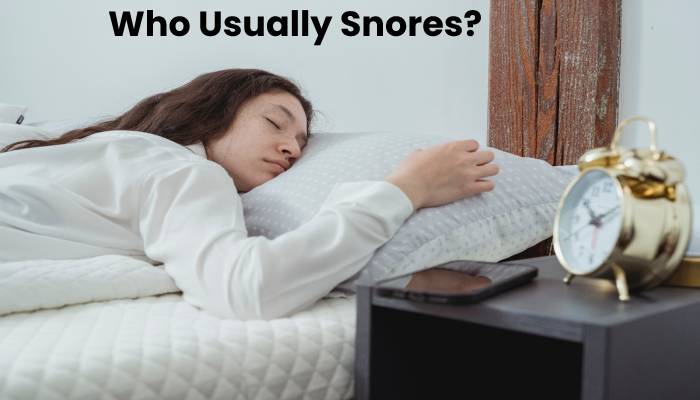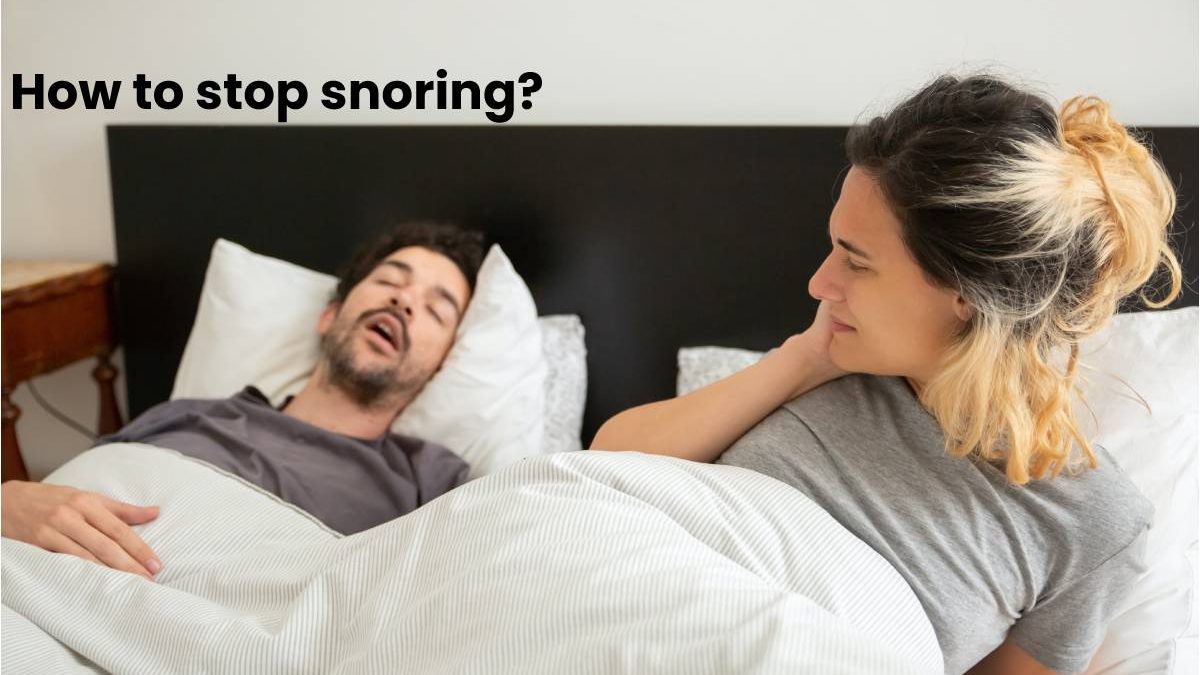How to stop snoring? – Snoring can be the cause of nocturnal awakenings, daily fatigue and irritability. Are you or your partner prone to snoring? Discover the advice of general practitioners on Live to finally spend peaceful nights.
Nocturnal awakenings, daily fatigue, or even irritability can result from nights disturbed by snoring. Are you or your partner prone to snoring? Discover the advice of our general practitioner Live to spend peaceful nights finally.
Whether quiet or loud, snoring can be disturbing, not only for partners but also for snorers themselves.
Snoring is very common. Usually are not severe, but sometimes canisters are linked to an underlying health problem and affect the quality of your sleep.
Table of Contents
What are the Causes of Snoring?
Snoring is a noise that happens during sleep. The snoring sound can begin in different airways, including your nose, your uvula small fleshy appendage at the back of your throat), your pharynx (the back of your throat), your tonsils or the base of your tongue.
Snoring occurs when the walls of any of these regions relax and sag. The collapsed parts then begin to vibrate as the air passes through them during inspiration and expiration. This phenomenon is natural, although not everyone snores.
Who Usually Snores?
We may snore occasionally, but research shows that this phenomenon increases as we get older. Indeed, snoring is a common problem among people between 40 and 60 and mainly affects men. Half of the men suffer from snoring compared to about a quarter of women. Snoring is also a family affair.

Why do we Snore?
Snoring is usually not due to an underlying problem. Still, certain disorders can promote it, including obesity, an overactive thyroid, enlarged tonsils, or nasal congestion, such as a cold or a deviated septum (when the wall between your nostrils shifts to one side).
Our lifestyle plays a significant role in the occurrence of snoring. It is indeed more likely to snore after consuming alcohol shortly before bedtime. Regular smokers, people on sleeping pills or sedatives, and those who sleep on their backs are also more prone to snoring.
What is the Relationship Between Weight and Snoring?
Research has exposed that being overweight or obese can disrupt your sleep and cause snoring. Excess weight on the airways makes them more easily prone to collapse, affecting sleep quality and inducing a state of fatigue upon waking.
There is a strong link between being heavy and developing obstructive sleep apnea syndrome (OSAS). Sleep pane is a severe condition that occurs when the airways collapse so much that it temporarily prevents you from breathing.
When this happens, usually in the middle of the night, your oxygen levels can drop, causing you to wake up.
How do I know if My Snorting is Set by Something Serious?
To find out if your snoring is problematic, doctors on Live recommend filling out this questionnaire by answering yes or no: STOP-Bang questionnaire.
- Do you snore loudly (enough to be heard through closed doors)?
- Do you often feel tired, exhausted or sleepy during the day?
- Has anyone ever noticed that you stop living while you sleep?
- Have you ever been preserved for high blood pressure?
- Is your BMI over 35?
- Are you over 50?
- Is your neck circumference better than 40 cm?
- Are you a man?
Answering positively to these questions does not necessarily mean that you have sleep apnea, but the risk that you do is higher. Report your score to a doctor to determine if you need to see a specialist.
How to Stop Snoring?
Different methods exist to help you stop this snoring. Modify your lifestyle or more elaborate remedies: find all our advice to fight against snoring!
1. Make Some Lifestyle Changes
It is not always essential to make big vagaries to remedy snoring. A balanced lifestyle is enough in many cases to help you. Try :
- Maintain a healthy weight;
- Engage in regular physical activity;
- Reduce your alcohol consumption;
- Reduce or quit smoking;
- If necessary, reduce or stop sleeping pills and other sedatives.
2. Sleep on Your Side
Please tell me how you sleep. I’ll let you know if you snore. Indeed, certain positions promote snoring. If you are inclined to sleep on your back, you increase your chances of snoring. So favor lateral positions. If you fall back on your back, you can try the following technique: sew a pocket on the back of your pajamas, in which you can insert a small ball or a tennis ball. It will prevent you from settling down in this position overnight.
3. Prevent Triggers
In case of snoring triggered by an allergy (pollen, animals. Be sure to vacuum regularly, including the sofa and the mattress. In summer, avoid drying your laundry outside. Pollen could slip in. If possible, do not let your pets climb on your bed. In case of nasal congestion or sinusitis, an antihistamine treatment or a cortisone-based nasal spray may go by your doctor to relieve them.
4. Try Anti-Snoring Devices
Against snoring, many devices exist:
- When sleeping, nasal dilators are introduced into the nostrils if you suffer from nasal congestion.
- If you incline to breathe through your mouth, you can buy an anti-snoring bandage that wraps around your chin, which will keep your mouth closed and force you to breathe through your nose.
- Some find the acupuncture rings available online helpful.
However, always seek your doctor’s advice before trying any remedies.
What is the Treatment For Sleep Apnea?
If a condition like sleep apnea causes your snoring, you’ll need treatment.
In most cases, people with sleep apnea are too busy to sleep with a continuous positive airway pressure, CPAP, and machine. The CPAP machine attaches around the nose and mouth to force the airways open with intense air pressure when the person inhales. It thus makes it possible to prevent the oxygen level in the patient’s blood from falling and consequently promotes the latter’s sleep.
It can be challenging to get used to sleeping with this machine. Using it every night, however, allows you to obtain convincing results.
What Should I do if My Partner Snores?
Sleeping next to a person suffering from occasional or permanent Snorting can be complicated and impact the couple’s relationship.
Fortunately, solutions exist to improve the quality of sleep. Go to bed earlier than your spouse, wear wax earplugs, listen to white noise, or turn on a fan to mask your partner’s Snorting.
If these methods don’t work, tackle the problem as a team! Encourage your partner to make changes in his lifestyle and accompany him to implement anti-snoring devices. Support each other as much as possible to help each other sleep better.
When should I consult About My Snoring?
It is important to note that overweight people who snore do not always suffer from OSAS. Most often, snoring is nothing to worry However. It is necessary to talk to a doctor if you show signs of possible sleep apnea.
It is indeed optional to seek advice from a health professional if:
- Snore at least three times a week;
- Your snoring is very loud or bothersome;
- Your make choking or gasping sounds;
- You are sleepy or have trouble concentrating during the day;
- You have a headache in the morning.
If these symptoms negatively impact your life, it is vital to see a doctor determine if further testing or treatment is needed.

